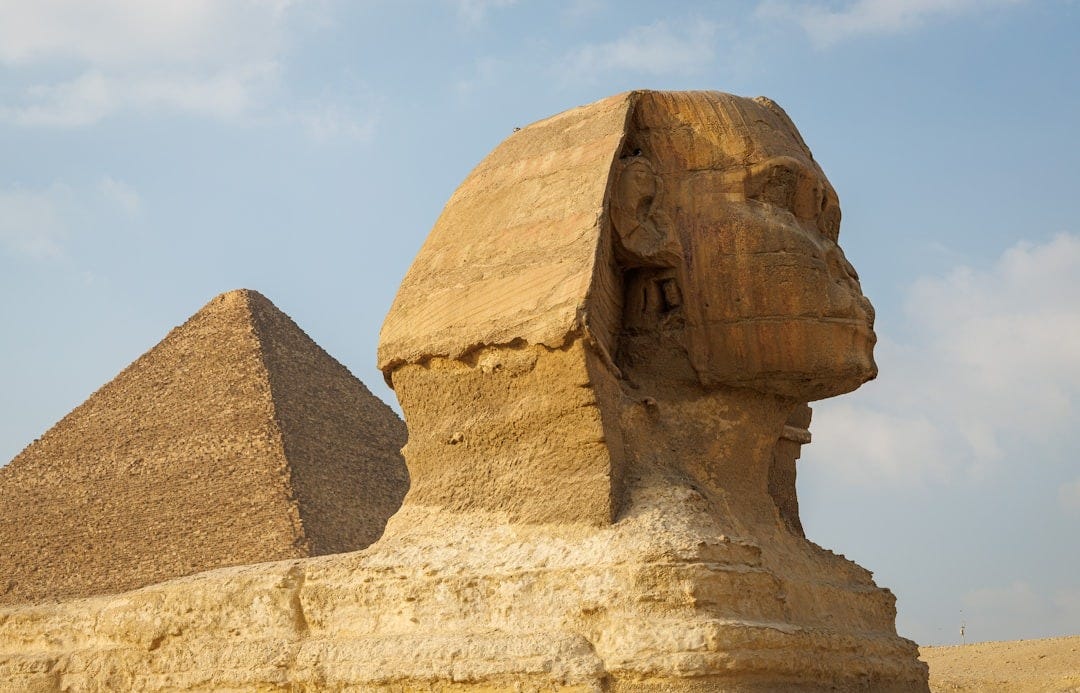Why everyone wants a piece of ancient Egypt
Description

Episode Summary
I don't get to do a lot of ancient history episodes on this show, but I always love it when I get the chance, and that's because history is a mirror of the present. Not because we judge or even fully understand the people who lived in ancient times, but because they were humans just like we are now.
Ancient Egypt has always had a magnetic pull. In ancient times, people were very interested in what the Egyptians were doing, and with good reason. In more recent times, Egypt has developed an aura of mystery, especially for followers of Joseph Smith, the founder of the Latter-day Saint movement.
But there’s something even deeper than the hidden tombs and eternal life legends: A lesson of what makes us human, and what justice means.
I'm pleased to be joined on this episode by Kara Cooney. She is a professor of Egyptology at the University of California Los Angeles, and she's written a number of interesting books on its history.
We’ll be talking about some of the themes in one of these books in particular called The Good Kings: Absolute Power in Ancient Egypt and the Modern World. She's also the host of the podcast Afterlives of Ancient Egypt, which will soon be appearing in the Flux podcast feed.
The video of this episode is available, the transcript is below. Because of its length, some podcast apps and email programs may truncate it. Access the episode page to get the full text. You can subscribe to Theory of Change and other Flux podcasts on Apple Podcasts, Spotify, Amazon Podcasts, YouTube, Patreon, Substack, and elsewhere.
Theory of Change and Flux are listener supported. We need your help to keep going. Please subscribe to stay in touch!
Related Content
Kara’s “Out of Egypt” mini-series
The ancient Greek Skeptic traditions have renewed relevance in an age of misinformation and propaganda
Why pluralism was the biggest Renaissance invention
Inside the demon-haunted world of Christian fundamentalism
The desire to submit to authority is as old as humanity itself 🔒
Susan Sontag’s essay, “Against Interpretation”
Audio Chapters
00:00 — Introduction
04:40 — Ancient Egyptians were regular people, even though it's easy to forget
14:11 — A brief overview of ancient Egyptian history
20:35 — The Exodus narrative and historical evidence
28:33 — The fall of civilizations and modern parallels
32:11 — Mormonism's Book of Abraham and Egyptian lore
38:53 — Religious neo-orthodoxy and Susan Sontag's "Against Interpretation"
45:08 — Akhenaten's religious revolution
52:16 — The Ma'at goddess and wisdom traditions
01:02:17 — Universal human understanding of fairness
01:05:55 — Conclusion
Audio Transcript
The following is a machine-generated transcript of the audio that has not been proofed. It is provided for convenience purposes only.
MATTHEW SHEFFIELD: It's great to have you, but for people who don't know you, Kara, tell us give us a little background on some of the research that you've done. What do you do in Egyptology?
KARA COONEY: I've been in the field now for 30 years, which is terrifying, but I started my PhD work in 1994. So there we are. My work started with Social competition and rich people competing with each other. And I did that through the lens of coffin research. So I will forever be associated with coffins and I call myself ‘Coffin Girl’ sometimes, which is strange.
But, it's amazing what you can learn from a coffin as a social document. And that's been the gift that keeps on giving because I now am embedded in coffin reuse research. So I look at how rich people would take other rich dead people out of their coffins, and they might have been related to them, they might not have been, but they will reuse those coffins for—
SHEFFIELD: Oh my God.
COONEY: —freshly rich dead people. And it's very much associated with collapse and crisis and ripping up social contracts and, drought and collapse, which I think are very much on the mines. Of people today. And so that work on coffin reuse has been very topical and helped me to see what we're going through, what it means, how long such collapses last, when they're the worst, things like that.
[00:04:00 ] And then the more—I won't say it's happy and fuzzy because it's not—but the more popular side of my work is on women in power. I teach a very popular class at UCLA called Women in Power in the Ancient World. And that has driven me to work on a number of books. One on Hatshepsut, another on six queens of the ancient world, five of whom became king.
And then I'm working on a book about Nefertiti right now, which is damn is it hard to get through all of that scholarship and try to determine what my story shall be. I feel the weight of that book as I'm working on it now. So that's me in a nutshell.
Ancient Egyptians were regular people, even though it's easy to forget
SHEFFIELD: Okay. And then, so all, if you could also talk about just like some of the challenges that are kind of unique about studying Egyptian history compared to some of the more well,
COONEY: Yeah.
SHEFFIELD: Longer known historical please.
COONEY: There, there are so many I, shall start with the over idealizing of Ancient Egypt. By us, by them, by everyone. It's a place that Herodotus said was more religious than any other, that the Egyptians were more religious than any other people. It's a place that perfected political propaganda through religious means.
And because of that, we're, it's hard for us to then pull the veil aside and see authoritarianism instead of religious belief and freedom of religion and or to see a more cynical, brutal patriarchal taking rather than a fatherly guidance. And that is indeed why I wrote the book, the Good Kings, which annoyed many of my coll





